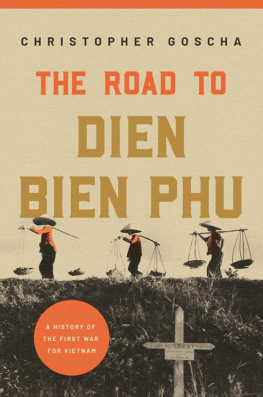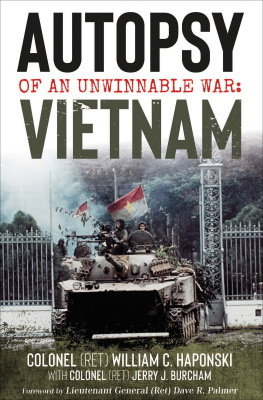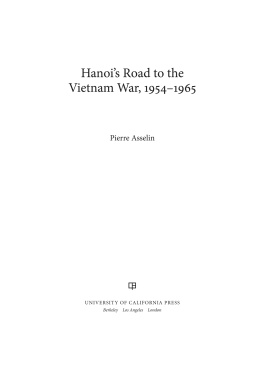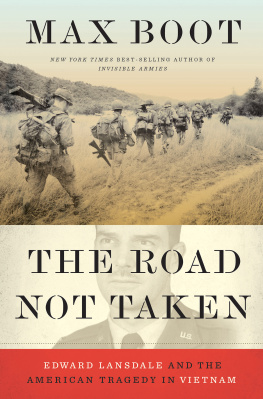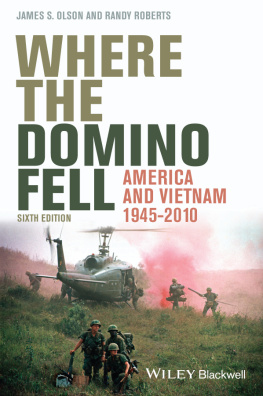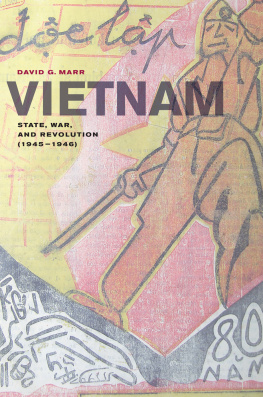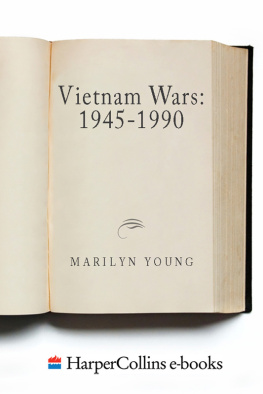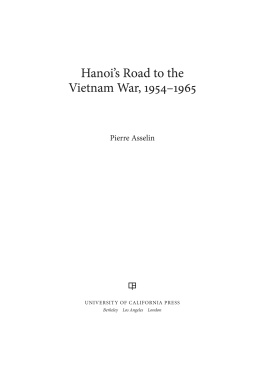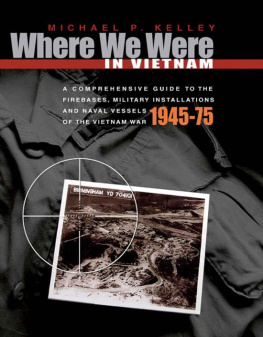P ROJECTS SUCH AS The First Mistake are impossible without the assistance and encouragement of key people. The relationship between the United States and Vietnam seems to be on the road of reconciliation. I sensed the early stages of this positive development while researching my two earlier books. Perhaps we share a common enemy in today's world. Teacher Vy My of Ben Tre represents the birth of this friendship. She supplied me with visual images of her beautiful homeland, which included French architecture. Poet Dang Than of Hanoi confirmed that agents from the Office of Strategic Services and Ho Chi Minh had formed a close relationship in 1945, a missed opportunity. Professor Ha Nguyen of Duy Tan University in Da Nang confirmed the potency of dnationalism and independence which flows through his country.
In America, my friend, Joseph Galloway, is a towering figure in journalism. His heroic experiences in 1965 at Ia Drang Valley with a greatly outnumbered American force resulted in the book We Were Soldiers which he wrote with Hal Moore and became a Hollywood blockbuster starring Mel Gibson. Joseph continues to be a champion for the warriors of the Vietnam conflict, reminding us of their sacrifices. He, also, confirmed that Ho and the Americans could have taken a different path in 1945 with the encouragement of apparently disinterested Washington policymakers. I appreciate his assistance early in this research.
My retired Winthrop University colleague, Dr. Jason Silverman, an Abraham Lincoln scholar, has been my friend for three decades. He and I share similar views on many things, and I appreciate his suggestions as this endeavor neared conclusion. We both were elected officials at one time, and we both understand that academics must reach beyond the Ivory Towers.
My parents, Tyre Douglas Lee, Sr. and Ola Bankhead Lee introduced me to history at an early age. They were Giants, members of what NBC News Tom Brokaw superbly labeled the greatest generation. My father, who was Old Army, graduating from Infantry School at Fort Benning, Georgia in 1931, found himself swimming ashore at Normandy in the summer of 1944. Returning to South Carolina, he heeded my teacher mother's advice and became a police officer, leading a small southern town through the tumultuous 1960s. He and my mother took my brother, Tyre D. Lee, Jr., a Vietnam War veteran, and me to the state of Virginia when we were youngsters, visiting the home places of our Lee ancestors at Arlington and Stratford Hall, homes that had been lost when earlier generations made their own mistakes.
Dr. Hugh Charles Toby Haynsworth, a retired naval commander who became a College of Business professor at Winthrop University, helped immensely with my first two Vietnam books, opening doors and sharing contacts which were invaluable. He, and his wife, Martha Bragg Haynsworth became friends who laid the groundwork for The First Mistake.
Mentors inspire us, and I have benefitted from the wisdom of quite a few: Drs. Thomas S. Morgan, Ross A, Webb, James C. Casada, Birdsall S. Viault, John J. Duffy, Lacy K. Ford, Robert Weir, Edward Cox, and George C. Rogers, Jr. All through graduate school and beyond, these people offered advice which helped prepare me for my own thirty-six-year career. Mentors at Winthrop University include some of the above and Professor Ron J. Chepesiuk, a prolific writer and archivist. David Goldfield of the University of North Carolina-Charlotte continues as a mentor, as he explores the twentieth century.
Early in my career, I brushed up against some of the towering figures in my profession: Arthur M. Schlesinger who was at Hofstra University when I presented a paper at the 50th anniversary of Pearl Harbor Conference, Stephen Ambrose who chatted with me in 1990 at the University of Kansas when I presented at the Dwight Eisenhower Conference, and George Brown Tindal who advised me, Always teach the United States Survey courses. I have followed that advice.
Just as I have benefitted from the wisdom of mentors, I have shared advice with exceptional graduate students. Some have gone on to write their own books: Deann Segal, Gwen Shealy, Sandi Ludwa, Tally Johnson, and Buddy Motz. Others are not far behind: Marlana Mayton and her research about Winthrop students who helped break the Nazi code in World War II and Ozlem Karakas of Turkey and her fresh look at the 1915 Armenian genocide.
Finally, as always and most importantly, I thank my wife, Ann-Franklin Hardy Lee, and daughter, Elizabeth Ann Lee Walen, who have always been supportive of my love of history. They both know that I love them best of all.
It is well that war is so terrible or we should grow too fond of it.
Robert E. Lee, 1862
O NE OF MY graduate history courses at Winthrop University is called America At War. We commence with the American Revolution and conclude with our response to 9/11. I stress to the students that the Framers of the United States Constitution set forth a clear mechanism for sending our sons and daughters into combat. The president requests a Declaration of War, making the case, and the Congress debates and approves (or rejects) it by a 2/3 vote. We have followed that clear procedure exactly five times: 1812, 1846, 1898, 1917, and 1941. Usually, we ignore our Constitution, as Abraham Lincoln did with his undeclared war in 1861 and in Korea and Vietnam. More often, 300 times, we have expended blood and treasure without a formal Declaration of War.
Each year as I teach that course, I am cognizant of the fact that most of my students have never lived in a period of peace. From the aftermath of the terrorist attacks of September 11, 2001, our nation has been at war, specifically in Afghanistan and Iraq. While our educational institution offers a minor in Peace Studies, the reality is that war in faraway places has shaped the lives of today's college students. As I reflect on my nearly four decades in the university classroom, wars and rumors of wars have hovered over my career and the material I teach. My research seems to perpetually become ensnarled in battles and the sacrifices of men and women who find themselves facing the enemy, often an enemy like the Taliban in Afghanistan or the Viet Cong, who faded into the countryside of Vietnam. Death and destruction haunt my curriculum.


